Search
Search Results

Definition
Ancient India
India is a country in South Asia whose name comes from the Indus River. The name 'Bharata' is used as a designation for the country in their constitution referencing the ancient mythological emperor, Bharata, whose story is told, in part...
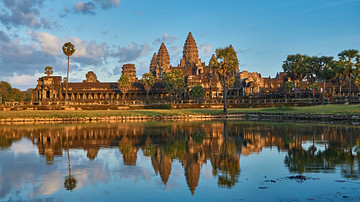
Definition
Angkor Wat
Angkor Wat is a temple complex in the province of Siem Reap, Cambodia originally dedicated to the Hindu god Vishnu in the 12th century CE. It is among the largest religious buildings ever created, second only to the Temple of Karnak at Thebes...

Video
Hanuman - The God Of Courage
Lord Hanuman is best known for his Strength, Perseverance and most importantly courage. Hanuman's tale in the epic Ramayana - where he is assigned the responsibility to locate Rama's wife Sita abducted by Ravana, the demon king of Lanka...
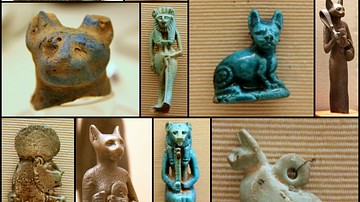
Article
Cats in the Ancient World
Cats and humans have shared in each other's lives for thousands of years and, even though they have not always been regarded as highly as in the present, have played an important role in a number of cultures. Always enigmatic, the cat has...

Article
Madhubani Paintings: People’s Living Cultural Heritage
Mithila, a region in the state of Bihar, northern India (and also stretching into Nepal), has an important tradition of knowledge in the form of paintings. Madhubani paintings (also known as Mithila paintings) have been practised by the women...
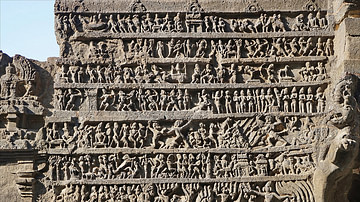
Image
Staircase of the Kailasa Temple, Ellora
Relief scenes from the Ramayana on the staircase of the Kailasa temple at Ellora, 8-9th century CE. Ellora, a UNESCO World Heritage Site, is a meeting place of Hindu, Buddhist and Jain art philosophies. A large portion of it was built between...
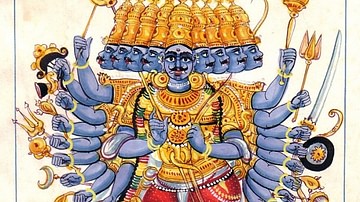
Image
Ravana the Demon King
A depiction of Ravana the rakshasa Demon king. In the Hindu epic poem 'Ramayana' Ravana is defeated by the hero Rama.
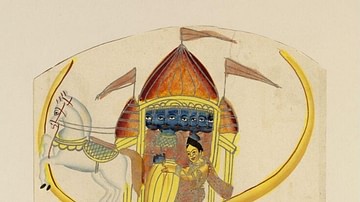
Image
Ravana Abducting Sita
This Kalighat painting depicts a scene from the Sanskrit epic, Ramayana where Ravana, a demon, abducts Sita, the wife of Rama. Jatayu, a demigod and a follower of Rama tries to rescue Sita. This painting originates from Kolkata, India, and...

Video
Prambanan Temple Compounds (UNESCO/NHK)
Built in the 10th century AD, this is the largest temple compound dedicated to Shiva in Indonesia. Rising above the centre of the last of these concentric squares are three temples decorated with reliefs illustrating the epic of the Ramayana...

Definition
Indus Valley Civilization
The Indus Valley Civilization was a cultural and political entity which flourished in the northern region of the Indian subcontinent between c. 7000 - c. 600 BCE. Its modern name derives from its location in the valley of the Indus River...